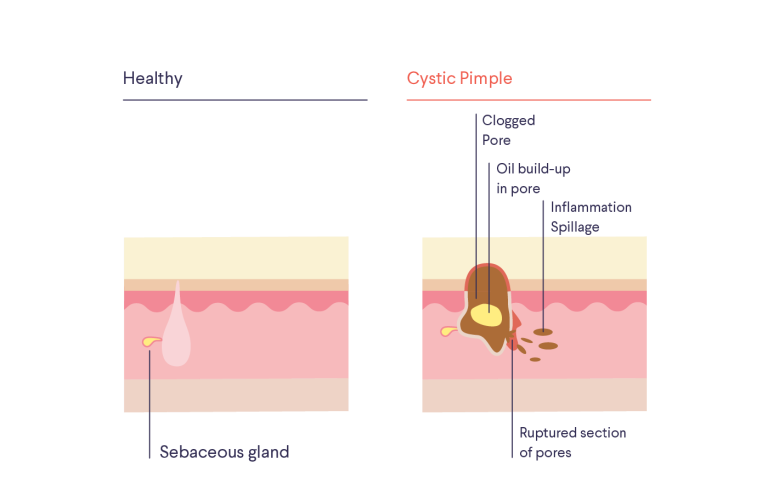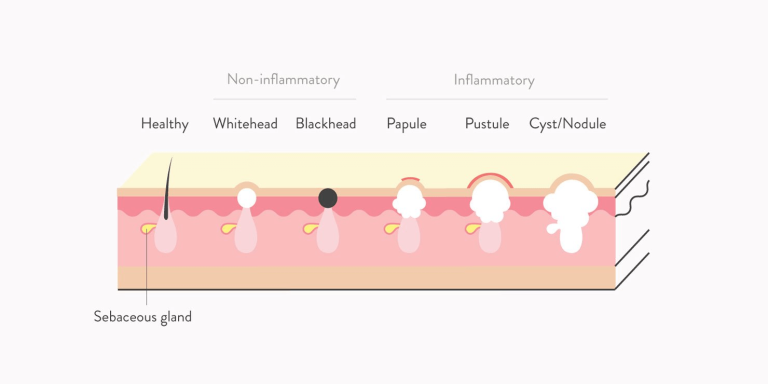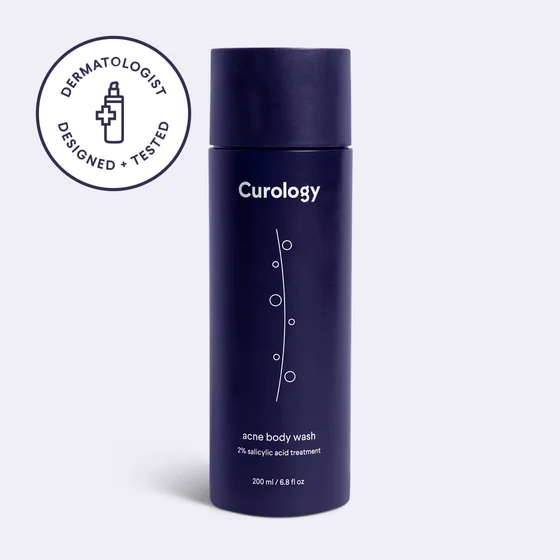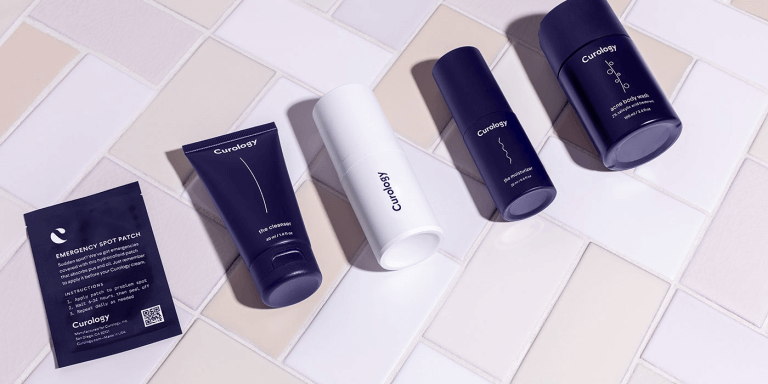How it works:
Share your skin goals and snap selfies
Your dermatology provider prescribes your formula
Apply nightly for happy, healthy skin
How it works:
How it works:
Share your skin goals and snap selfies
Your dermatology provider prescribes your formula
Apply nightly for happy, healthy skin
How it works:
Shoulder acne: What it is and how to get rid of it
All you need to know about shoulder acne – reasons behind it, types of acne, treatment and prevention.



Acne is an annoying condition that people experience through their teen years. About 85%¹ of people experience acne—primarily facial acne—beginning around age 12. But did you know that body acne, as well as facial acne, also plagues adults?² And that adult women are more often affected than men by persistent or recurring acne
Unfortunately, “bacne”³ and shoulder acne are real. But there’s help and hope. In this article, we’ll discuss shoulder acne—including what exactly is shoulder acne and ways you can treat this condition.
What is acne?
Acne vulgaris (the medical name for common acne) is one of the most common skin conditions. In addition to the blemishes it causes, acne can lead to scarring, worsening skin issues, and negative psychological effects such as anxiety and depression.
As mentioned previously, women are at an increased risk of developing acne as adults, potentially due to acne’s hormonal component. When most people think of acne, they think of facial blemishes. However, shoulder acne also exists—and it may be even harder to treat than facial acne.

What are the causes of acne on shoulders?
Acne on the shoulders is usually the result of clogged sebaceous glands (oil glands) and hair follicles. The pores become blocked with excess sebum and dead skin cells. Bacteria (C. acnes) that normally lives on the skin thrives in the excess oil and triggers an inflammatory response. Hormonal changes and genetics can also contribute to the onset and severity of acne.

Let’s explore the different types of blemishes caused by acne:⁴
Whiteheads
Whiteheads (or closed comedones) on shoulders form when pores become clogged with oil and dead skin cells. These types of blemishes are what people most commonly “pop” or pick at. However, as tempting as it can be, picking increases the risk of scarring, so dermatologists recommend proper treatment instead.
Blackheads
Shoulder blackheads are considered “open comedones.” the contents of the clogged pore (sebum and dead skin cells) are exposed to the air, undergo a reaction, and turn black—hence the name. Dermatologists also suggest refraining from picking these due to the risk of scarring.
Papules and pustules
Papules and pustules, characterized by small red bumps on the shoulders, are caused by a buildup of bacteria, dead skin cells, and oil. The result is a blemish that may or may not contain pus. Blemishes that don’t contain pus are called papules, and blemishes that do are called pustules. Pustules will often have a characteristic white “head.”
Nodules
Nodules, or nodular acne, are deep, inflammatory pimples that often feel painful. This type of acne can form when bacteria combines with sebum and dead skin cells in a clogged pore, leading to inflammation. Nodules are one of the toughest kinds of acne to treat—though it’s certainly not impossible to do so!
Acne cysts
As the bacteria, oil, and dead cells build up, some blemishes swell, becoming inflamed and painful. Though many people will often squeeze and pop them to try to relieve the pain and pressure, this can put you at risk for scarring or infection.

How to help get rid of shoulder acne
With a vast amount of content available on the internet, it’s often difficult to find the best treatment for shoulder acne. We’ll walk you through the most common options and their general effectiveness, including everything from home remedies to high-quality but affordable over-the-counter (OTC) products. Keep in mind, for treatment-resistant acne, prescription-strength options may be necessary (and we’ll cover those as well).
Topical treatments: salicylic acid and benzoyl peroxide
Salicylic acid⁵ is one of the most common ingredients in OTC skin products. It helps to clear out clogged pores and reduce inflammation. Salicylic acid can be found in many skin and face washes, moisturizers, sunscreens, spot treatments, and even concealers.
Benzoyl Peroxide is another common ingredient in many OTC combination skin treatments, and it can even be found in prescription-strength products. It is commonly used to treat⁶ acne vulgaris.
Salicylic acid and benzoyl peroxide both have anti-inflammatory properties to help treat breakouts, and both can help to unclog pores, but salicylic acid is generally a better option for exfoliation.⁷ A helpful component in getting rid of your shoulder acne can be a specialized Acne Body Wash. Curology’s includes 2% salicylic acid to help you prevent and treat shoulder breakouts.

Prescription remedies
If you have experienced acne for a while and have seen little to no improvement with traditional OTC products, it might be time to speak with your medical provider about prescription acne treatments. These may be oral, topical, or a combination of the two. Here’s a rundown of common prescription remedies and ingredients:
Standard topical prescription skin care options:⁶
Retinoids: These compounds are Vitamin A derivatives often used to treat acne. They unclog pores and stimulate the growth of new skin cells. Examples of retinoids include tretinoin.
Antibiotics:⁸ Since one of the causes of acne is skin bacteria (C. acnes), antibacterial creams, gels, and pads made using antibiotics like clindamycin have been shown to reduce the effects of acne.
Azelaic acid:⁹ Azelaic acid is a common skincare ingredient that helps dead skin cells shed, making it a great treatment for acne.
Dapsone:¹⁰ This is a gel prescribed at 5% and 7.5% strength. It has been found effective in reducing inflammatory lesions commonly associated with acne.

Standard oral acne treatment options:⁶
Antibiotics: The first line includes minocycline, erythromycin, and other medications in these classes.
Contraceptives: The FDA has approved products containing progestin and estrogen, such as Yaz. These products help with acne conditions influenced by shifting hormones.
Anti-androgen: These work by inhibiting hormones and their effects on glands that produce oil, leading to acne. One example is spironolactone.¹¹
Isotretinoin: This is an oral retinoid (Vitamin A derivative). It’s commonly referred to by its former brand name, Accutane.
Shoulder acne prevention
You can help prevent acne in several ways. These include:
Showering after exercise
Washing sweaty clothes and changing into different clothing after sweating
Avoiding picking at your skin
Exfoliating your skin
Using sunscreen and practicing other methods of sun protection
Being mindful of your food—certain food groups (such as dairy) may increase your risk of developing acne
Washing your pillow cases often—these can harbor sweat
Avoiding wearing tight clothes
Curology can help treat shoulder acne
Treating shoulder acne can be time-consuming and annoying, but don't fret—many options are available. Proper treatment involves preventative measures, such as showering after workouts, not picking at your skin, and finding a high-quality body wash. Most people start with over-the-counter treatments, such as salicylic acid or benzoyl peroxide, which may or may not work.
If OTC treatment options aren’t doing the best job, you can consult a professional regarding the need for prescription-strength treatment options.
Get your personalized skincare routine with Curology
Get your personalized skincare routine with Curology


Curology offers an online consultation process where you can upload photos of your skin and select your skin type and concerns, and one of our licensed dermatology providers will develop your personalized treatment plan. We’re there to help you throughout your journey to healthier and happier skin. You can sign up and start your trial today*.
FAQs
While it may be nearly impossible to rid yourself of those annoying red bumps in one night, there are treatments to help reduce swelling. Try warm compresses to draw out the bacteria, but don’t make them too warm. We don’t need to add a burn. Just remember, everyone experiences acne at some point. Don’t let a few little bumps ruin your life. Be confident and wear that dress!
While it can seem like a quick cure, dermatologists recommend that you keep your hands off your pimples. Popping them can actually prolong healing and cause infection.
The pain comes from swelling. It’s temporary and nothing to worry about. If your acne is deep and cystic, topical treatments may not be enough. Take a few pictures and our quiz and get help today from the comfort of your own home. Curology is here to help.
P.S. We did the homework so you don’t have to:
American Academy of Dermatology Association. Skin Conditions by the Numbers. (n.d.).
Collier, C.N., et al. The prevalence of acne in adults 20 years and older. J Am Acad Dermatol. (Jan 2008).
Curology. How to treat and help prevent body acne, according to experts. (2022, August 10).
Bagatin, E., et al. Adult female acne: a guide to clinical practice. Anais Brasileiros de Dermatologia. (Jan-Feb 2019).
Curology. Chemical exfoliation 101. (n.d.).
Zaenglein, A.L., et al. Guidelines of care for the management of Acne Vulgaris. Journal of the American Academy of Dermatology. (May 2016).
Curology. Everything you need to know about benzoyl peroxide for acne. (n.d.).
Lazic Mosler, E., et al. Topical antibiotics for acne. The Cochrane Database of Systematic Reviews. (Jan 2018).
Graupe, K., et al. Efficacy and safety of topical azelaic acid (20 percent cream): an overview of results from European clinical trials and experimental reports. Cutis. (Jan 1996).
Nickles, M.A. and Lake, E. Topical dapsone in the treatment of acne: a systematic review. International Journal of Dermatology. (Nov 2022).
Curology. What you need to know about taking spironolactone for hormonal acne. (n.d.).
Melissa Hunter is a board certified family nurse practitioner at Curology. She received her MSN from George Washington University in Washington, DC. *Subject to consultation. Cancel anytime. Results may vary.

Curology Team

Melissa Hunter, NP-C